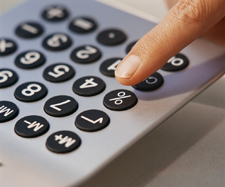Budgeting: living within your means
Regardless of how much or how little you are concerned about money, there's no denying that life would be more comfortable, secure and carefree with more control over personal finances. Taking stock and creating a realistic budget can help achieve just that.
Losing Control
Money problems can be one of the greatest sources of stress. It's easy to get in over our heads and difficult to get out. But not impossible. Whether you're feeling pressure to make ends meet or trying to curb bad spending habits, it's important to take one step at a time to reverse negative patterns, get the needed support and move in a positive, secure direction.
Typical indicators of a lack of financial control include:
- Experiencing "money crises" as regular events
- Worries about what will happen if…
- No budget or an unrealistic one
- Irregular expenses (e.g., holidays, illness, etc.) are not budgeted for
- Overextended credit
- Borrowing at the wrong places and paying too much interest
- Renting instead of owning
- No RRSPs or an RRSP chosen hastily without considering the underlying investments, fees, or options
Personal Budgeting
One of the first steps to gain control of your financial situation is to create a personal budget to ensure you are living within your means. Here are some guidelines:
-
Begin by keeping a log of exactly where your money goes each day, each week and each month.
-
Tally up your monthly fixed expenses. Set up a schedule and method of bill payment that ensures you pay on time, every month. Take advantage of pre-authorized chequing, telephone and online banking that make bill payment automatic and almost painless. Prompt bill payment lets you know exactly what's coming in and going out, and will enhance your credit rating over time.
-
Allow an appropriate amount for variable expenses, such as groceries, gifts, dry cleaning and entertainment. Don't set yourself up to fail. Estimating too low will place unrealistic and unreasonable demands on your financial resources.
-
Pay yourself first. Putting away even a small amount, such as $25 per month, into savings will add up over the long run. A reasonable amount to aim for is 10 per cent of your net annual salary.
-
If a budget is going to work, it has to be flexible. Allow for unexpected items such as car repairs, unplanned trips, and unforeseeable medical costs.
Watch the Pennies, and the Dollars Will Follow
To help get your new budget in gear, it's useful to see where you might be able to trim your current spending without changing your lifestyle too drastically. Consider the following:
-
Shop around for better prices on your auto or home insurance. Consider increasing your deductible to reduce your premiums.
-
Investigate getting your mortgage payments reduced. If you can swing it, and your mortgage arrangements allow for it, consider semi-monthly payments. The difference this can make over the life of your mortgage is remarkable.
-
Eat out less. Not only will you save money, but you’ll probably get more enjoyment from eating out if it is a special occasion.
-
Review your daily spending log and determine if there are frivolous items you can save on. For example, if you find yourself buying magazines every month from the newsstand, consider getting a subscription to take advantage of better rates. Perhaps you are paying a premium for same-day dry cleaning, or an extra charge for late videos that can be eliminated by spending a few extra minutes planning at the start of the week.
It's said that money can't buy happiness, but the proper management of your financial situation sure can make life a lot easier. Put yourself in the position of taking advantage of your financial affairs, rather than letting your financial affairs take advantage of you.
